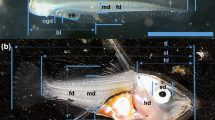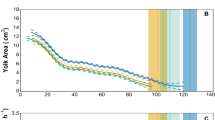Abstract
Cephalopod mollusks exhibit highly plastic life cycle traits influenced primarily by the interactive effects of food availability, light cycle and temperature, with the latter perhaps the most influential. Hatchlings of the tropical reef squid Sepioteuthis lessoniana were hatched from field-collected eggs in the laboratory and cultured at different temperatures to evaluate the effect of temperature on growth rates. All groups showed rapid, sustained growth rates from hatching to a size of 10–25 g. Beyond this size range, growth was slower and not clearly exponential in form. Growth rate was closely linked to temperature. Squids grown at approximately 27 °C attained a size of 10 g in as little as 45 days at sustained growth rates of 12.2% body weight day−1 (%bw day−1), while squids cultured at 20 °C required almost 100 days to attain the same size at rates of 5.7%bw day−1. At an age of 55 days and approximately 1 g body weight, juvenile squids cultured at 20 °C were able to accelerate growth rates from 5.7%bw day−1 to over 12%bw day−1 when temperature was raised to 27 °C. They maintained this growth rate to a size of about 10 g and an age of at least 75 days post-hatching, indicating that body size and not age is the limiting factor for this rapid post-hatching growth. By comparison, conspecifics cultured near 27 °C from hatching had shifted out of the rapid post-hatching growth phase by day 50 at sizes between 10 and 50 g. The hatchlings from temperate to subtropical Japan had consistently higher growth rates at comparable temperatures than hatchlings from tropical Okinawa. When plotted as growth rate versus temperature, the Japanese group had a clearly higher slope to the relationship than the tropical populations, equivalent to a 2%bw day−1 difference in growth rate at 25 °C. Age at first egg-laying was decreased at higher culture temperatures; however, overall life span was not.
Similar content being viewed by others
Author information
Authors and Affiliations
Additional information
Received: 21 February 2000 / Accepted: 6 September 2000
Rights and permissions
About this article
Cite this article
Forsythe, J., Walsh, L., Turk, P. et al. Impact of temperature on juvenile growth and age at first egg-laying of the Pacific reef squid Sepioteuthis lessoniana reared in captivity. Marine Biology 138, 103–112 (2001). https://doi.org/10.1007/s002270000450
Issue Date:
DOI: https://doi.org/10.1007/s002270000450




